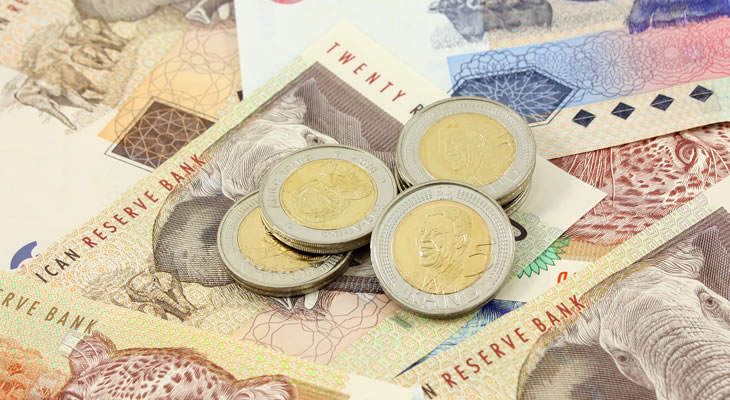Pound to South African Rand Exchange Rate Trends Near Lows Despite UK Retail Data
Weak UK data earlier in the week has made the Pound Sterling to South African Rand (GBP/ZAR) exchange rate unappealing, and South African Reserve Bank (SARB) hawkishness has kept the pressure up.
Last week saw Sterling (GBP) benefit from broad South African Rand (ZAR) weakness to climb from 16.59 to 17.21 – but this week the pair has shed most of those gains.
On Wednesday evening, GBP/ZAR touched a low of 16.57. Despite some brief recovery attempts on Thursday, GBP/ZAR continued to trend closely to this low at the time of writing.
Demand for the Pound did improve slightly on Thursday, following the publication of Britain’s surprisingly strong April retail sales results. However, due to hawkishness from the South African Reserve Bank the pair’s recovery was limited.
This week’s market selloff in the US Dollar (USD) made risky emerging market currencies like the Rand more appealing and helped to push GBP/ZAR lower since Monday.
Pound (GBP) Exchange Rates Supported by UK Retail Sales Report
While its demand was limited, the Pound still benefitted on Thursday from the publication of Britain’s April retail sales results.
UK retail sales were forecast to have improved from -1.2% to 0.7% month-on-month, but instead improved from a revised -1.1% to a surprisingly strong 1.6%.
Meanwhile, the yearly figure was forecast to slow from 1.1% to just 0.1%. Instead, the figure climbed from a revised 1.3% to 1.4%. Figures excluding fuel also both beat forecasts.
According to Rob Kent-Smith from the Office for National Statistics, almost all retail sectors saw stronger performance in April:
‘Increases were seen across all sectors in April, except department stores. Department stores declined following relatively strong sales last month, when their online sales were boosted during the adverse weather.’
Following broad concerns that UK consumer activity was seeing a sustained downturn, the rebound in the latest report offset those fears somewhat.
However, analysts noted that overall Britain’s retail activity had still slowed over the long-term. As a result, the data did not have a major influence on Bank of England (BoE) interest rate hike bets and the Pound’s strength was limited.
South African Rand (ZAR) Exchange Rates Hold on South African Reserve Bank (SARB) Meeting
Thursday saw the South African Reserve Bank (SARB) hold its May policy decision. While the bank left monetary policy frozen as was widely expected, strong domestic consumer prices prompted the bank to adopt a more hawkish tone.
Stronger oil prices and a weaker South African Rand in recent weeks means that domestic price pressures are likely to continue to rise.
SARB Governor Lesetja Kganyago forecast that South African inflation would be at 4.9% in 2018, then 5.2% in both 2019 and 2020.
The bank was less concerned about the South African Rand’s value than it had been earlier in the year too.
With inflation looking to continue to rise and the Rand’s strength not an issue, SARB rate hike bets rose and this helped the Rand to hold near its best levels against Sterling.
Pound to South African Rand (GBP/ZAR) Forecast: UK Growth and Global Trade Developments in Focus
Bank of England (BoE) interest rate hike bets are still low despite Britain’s solid retail sales results from April, so investors may await more optimistic UK data before opting to buy the Pound.
Expectations that Britain’s economy performed poorly in Q1 2018 have weighed on BoE bets and Sterling, so if Friday’s UK Gross Domestic Product (GDP) projections beat expectations it could boost the Pound.
UK growth is currently projected to have slowed from 0.4% to just 0.1% quarter-on-quarter, and from 1.4% to 1.2% year-on-year.
Britain’s Q1 business investment projections may also influence Sterling demand before markets close this week.
As for the South African Rand, it is likely to continue to be influenced by risk-sentiment regarding global trade developments.
If traders remain hopeful that the US will back away from its most protectionist stances and the US Dollar (USD) continues to see weak trade, the Rand’s recovery could persist and keep pressure on the Pound Sterling to South African Rand (GBP/ZAR) exchange rate.


Comments are closed.